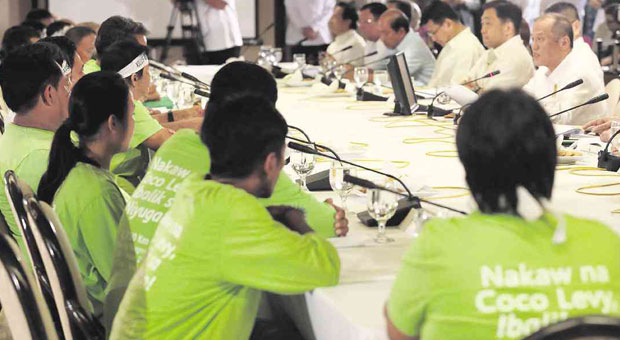
PRESIDENTIAL ASSURANCE President Aquino meets on Wednesday with coconut farmers who marched from Davao City starting on Sept. 21, the 42nd anniversary of martial law, to Malacañang. He assured them that the government is on their side and supports their efforts to recover coco levy funds. GRIG C. MONTEGRANDE
Their long walk to Malacañang did not exactly go to waste.
Assuring coconut farmers that the government was “on your side,” President Benigno Aquino III on Wednesday threw his support behind a bill outlining how they would directly benefit from P71 billion in taxes collected from them during the Marcos regime.
The President also gave the group Kilus Magniniyog his word that he would look into its proposal for an executive order putting up a Coconut Farmers’ Trust Fund.
“I hope it’s clear: You have our full support and we are on your side,” he told coconut farmers in Filipino in a meeting in Malacañang. “May you continue to trust [the government]. Help us in the struggle to achieve our singular objective for coconut farmers and the rest of the Philippines.”
The farmers wore green shirts with the words, “Nakaw na Coco Levy, Ibalik sa Niyugan.” For the meeting, the President assembled a powerhouse group of his Cabinet men: Presidential Assistant on Food Security and Agricultural Modernization Francis Pangilinan, Budget Secretary Florencio Abad, Justice Secretary Leila de Lima, Environment Secretary Ramon Paje, Executive Secretary Paquito Ochoa, and Cabinet Secretary Jose Rene Almendras.
Covering around 1,700 kilometers in 66 days, 71 coconut farmers calling themselves “KM71” marched from Davao City to Malacañang beginning Sept. 21, the 42nd anniversary of martial law, to dramatize their plight.
More important, small coconut farmers want to take control of and actually benefit from P71 billion in coco levy funds the government recovered from cronies of the late President Ferdinand Marcos.
“The best course of action I see is to craft a law. This would ensure that the next generation would enjoy the benefits brought by the coco levy fund and we would be spared from any legal obstacle in the future,” Mr. Aquino told the farmers.
He said coconut farmers would be “consulted primarily about the provisions that will be contained” in the bill, which he promised to certify as urgent “so it could be passed into law at the soonest time.”
Law, executive order
But pending such a law, the President was open to issuing an executive order ensuring that the coconut industry, especially small farmers, would enjoy the benefits of the coco levy fund.
Mr. Aquino agreed that the fund should be separate from the annual budget of the Philippine Coconut Authority.
“I also agree that we will use only interest income from the coco levy fund so that even the next generation of farmers would benefit from it,” he said.
Saying his administration “did not neglect” coconut farmers, he said the government had increased the PCA’s budget from P593 million in 2010 to P5.1 billion last year.
“Because of this budget, we were able to focus on programs that made your farm lands more productive,” he said.
At the outset, the President reminded the group that the Supreme Court had yet to decide on the motion for partial reconsideration of its 2012 ruling that the government owned the 27-percent block of shares of San Miguel Corp., the Coconut Industry Investment Fund (CIIF).
Only for farmers
The percentage was later reduced to 24 percent as a result of a Japanese brewer’s investment in SMC.
Another Supreme Court decision in December 2012 also ruled that shares transferred to businessman Eduardo “Danding” Cojuangco at United Coconut Planters Bank belonged to the government.
They were “to be used only for the benefit of all coconut farmers and for the development of the coconut industry, and ordered reconveyed to the government,” the high court said.
RELATED STORIES
Aquino backers back coconut farmers’ march
Coconut farmers from Mindanao reach Lucena
Davao coco farmers to join hunger strike on levy